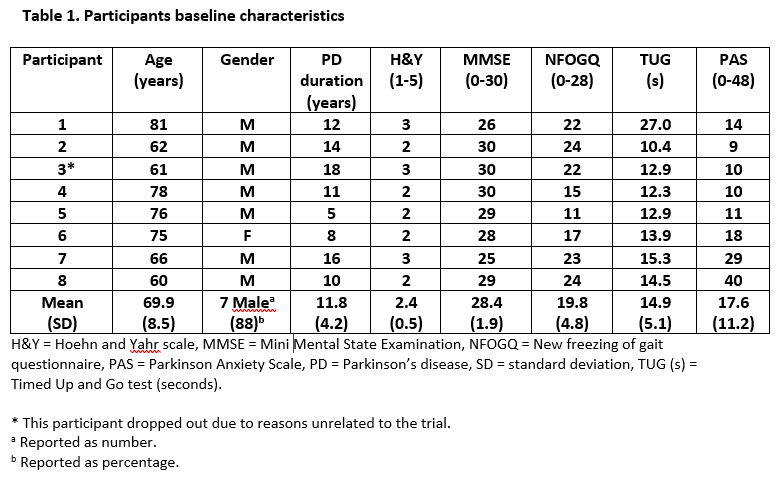Category: Parkinson’s Disease: Clinical Trials
Objective: To determine the feasibility and acceptability of video self-modelling using a virtual reality headset plus physical practice for managing freezing of gait (FOG) in people with Parkinson’s disease (PD).
Background: Despite optimal medical and/or surgical intervention, FOG occurs commonly in people with PD, especially with increased disease duration and severity. Action observation via video self-modelling, combined with physical practice, has potential as a non-invasive intervention to reduce FOG.
Method: This was a single group pre/post-intervention pilot trial. Ten participants with PD and FOG have been recruited. A physiotherapist assessed participants in their homes to identify person-specific triggers for FOG. 180-degree videos of participants successfully performing their movement strategies to overcome FOG were developed. Participants watched their videos using a virtual reality headset, followed by physical practice of their strategies in their own homes. Primary outcome measures included feasibility and acceptability of the intervention. Secondary outcome measures included FOG physical tests and questionnaires, Timed Up and Go test, 10m walk test, Goal Attainment Scale, and Parkinson Anxiety Scale.
Results: Eight participants have completed the trial to date [Table 1]. One participant dropped out due to reasons unrelated to the trial. The recruitment rate was 19% and retention rate was 88%. Five participants fully adhered to the prescribed program and three participants completed between 25% to 75% of the program. Seven participants reported the intervention was helpful during the post intervention interviews. Four participants needed assistance from their carers to operate the headset and/or supervise their physical practice. One participant was unable to tolerate the use of the headset due to dyskinesia but was able to complete the program using a flatscreen device. No adverse events were reported during the intervention.
Conclusion: These preliminary results indicate that video self-modelling using a virtual reality headset plus physical practice is a feasible intervention to manage FOG and acceptable to most of the participants. Further insights into acceptability and secondary outcomes will be gained once the remaining two participants have completed the trial.
To cite this abstract in AMA style:
L. Goh, N. Ahmadpour, N. Allen, L. Clemson, E. Gorgon, S. Lewis, H. MacDougall, K. Ehgoetz Martens, J. Song, C. Canning. A video self-modelling virtual reality intervention for freezing of gait in Parkinson’s disease: Preliminary findings from a pilot trial [abstract]. Mov Disord. 2020; 35 (suppl 1). https://www.mdsabstracts.org/abstract/a-video-self-modelling-virtual-reality-intervention-for-freezing-of-gait-in-parkinsons-disease-preliminary-findings-from-a-pilot-trial/. Accessed February 11, 2026.« Back to MDS Virtual Congress 2020
MDS Abstracts - https://www.mdsabstracts.org/abstract/a-video-self-modelling-virtual-reality-intervention-for-freezing-of-gait-in-parkinsons-disease-preliminary-findings-from-a-pilot-trial/

